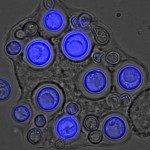Link to Pubmed [PMID] – 28490578
Link to DOI – 10.1128/CMR.00043-16
Clin Microbiol Rev 2017 Jul; 30(3): 671-707
Genotyping studies of medically important fungi have addressed elucidation of outbreaks, nosocomial transmissions, infection routes, and genotype-phenotype correlations, of which secondary resistance has been most intensively investigated. Two methods have emerged because of their high discriminatory power and reproducibility: multilocus sequence typing (MLST) and microsatellite length polymorphism (MLP) using short tandem repeat (STR) markers. MLST relies on single-nucleotide polymorphisms within the coding regions of housekeeping genes. STR polymorphisms are based on the number of repeats of short DNA fragments, mostly outside coding regions, and thus are expected to be more polymorphic and more rapidly evolving than MLST markers. There is no consensus on a universal typing system. Either one or both of these approaches are now available for Candida spp., Aspergillus spp., Fusarium spp., Scedosporium spp., Cryptococcus neoformans, Pneumocystis jirovecii, and endemic mycoses. The choice of the method and the number of loci to be tested depend on the clinical question being addressed. Next-generation sequencing is becoming the most appropriate method for fungi with no MLP or MLST typing available. Whatever the molecular tool used, collection of clinical data (e.g., time of hospitalization and sharing of similar rooms) is mandatory for investigating outbreaks and nosocomial transmission.


